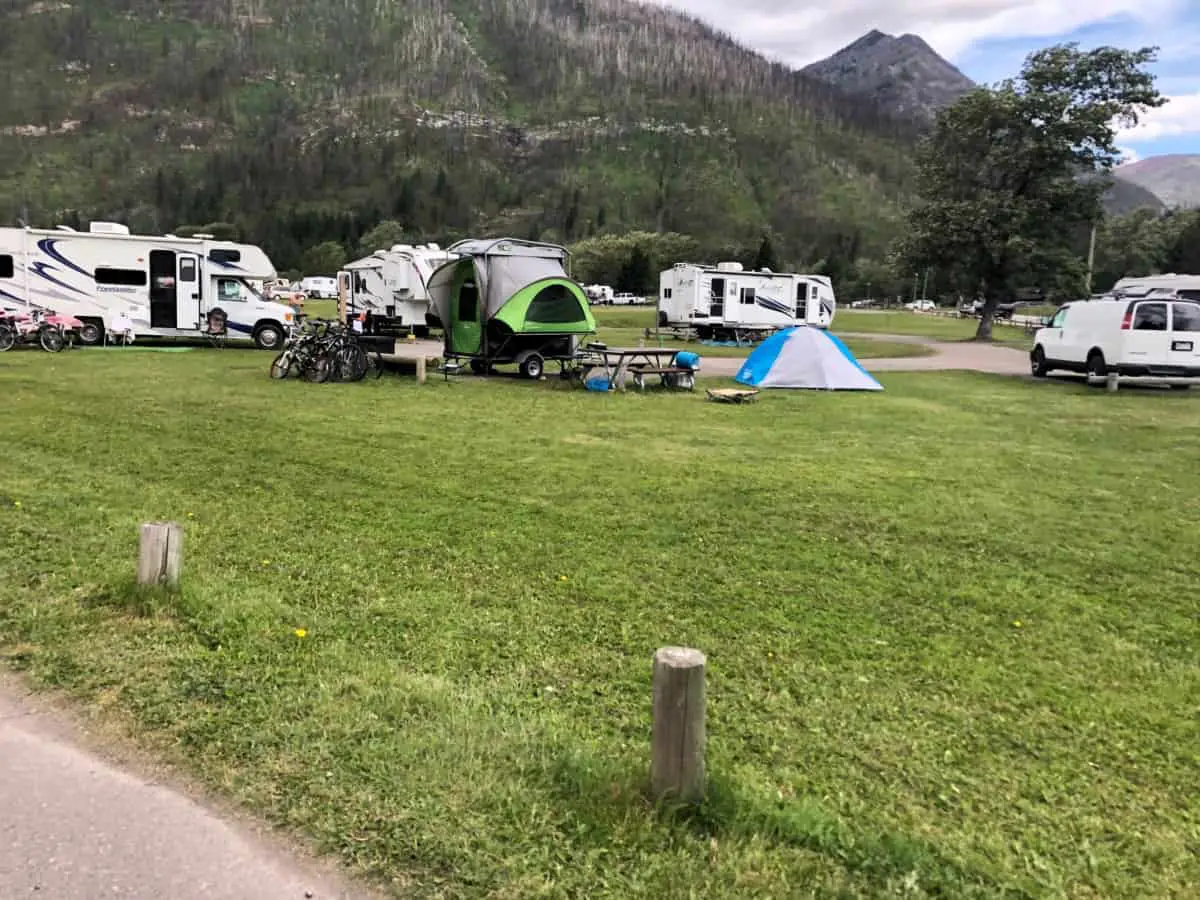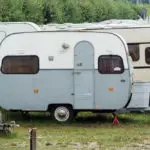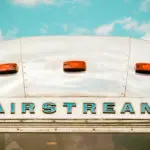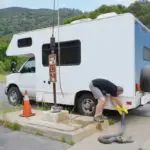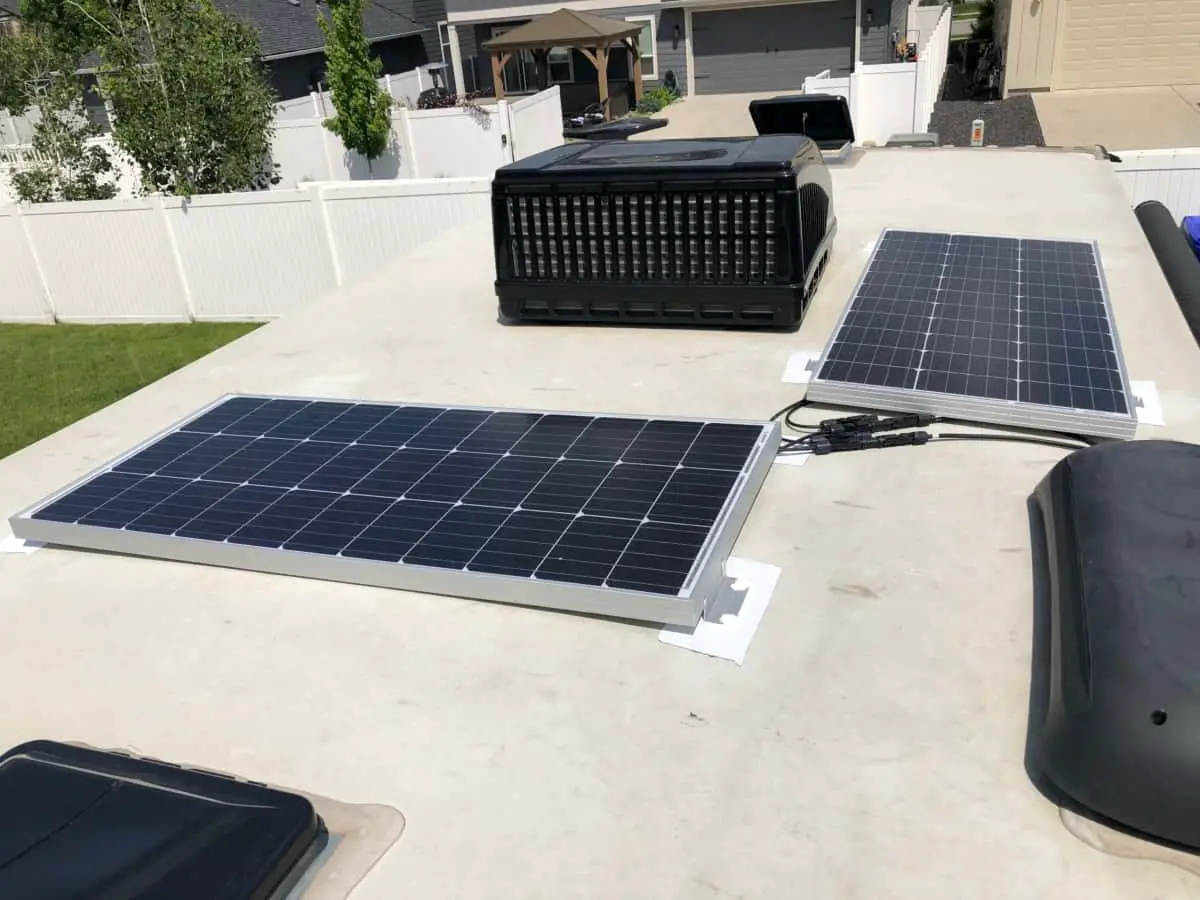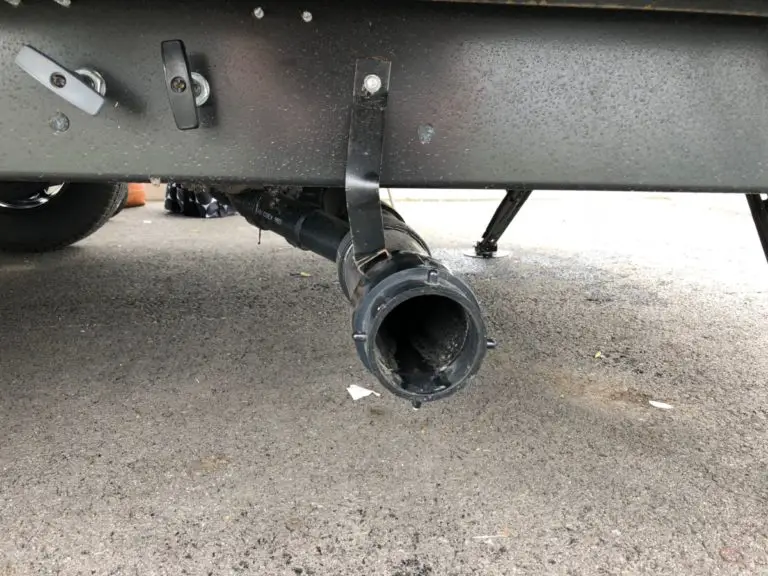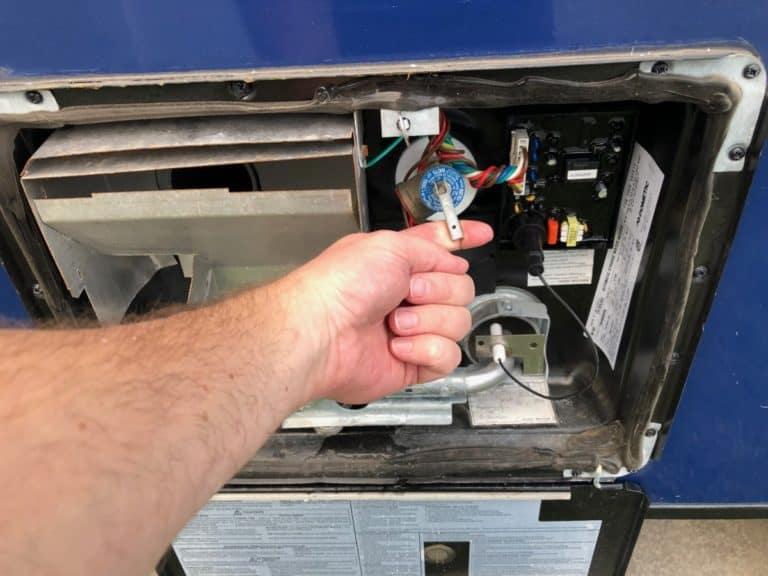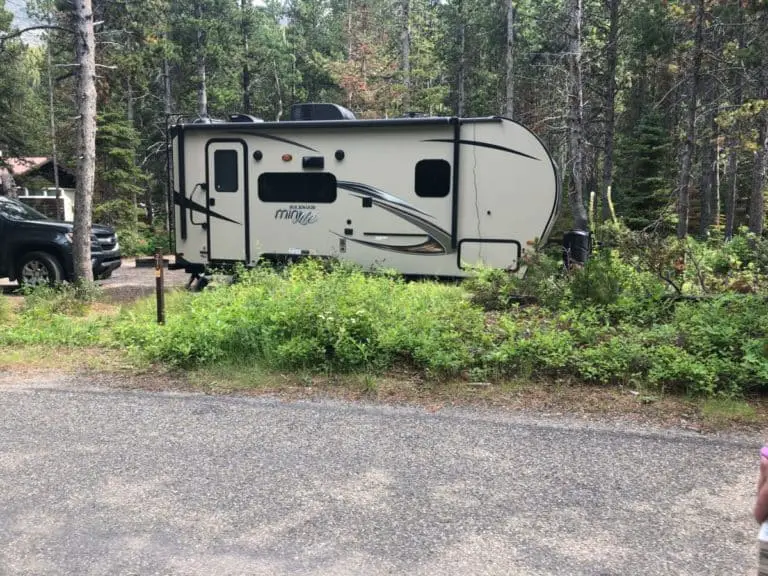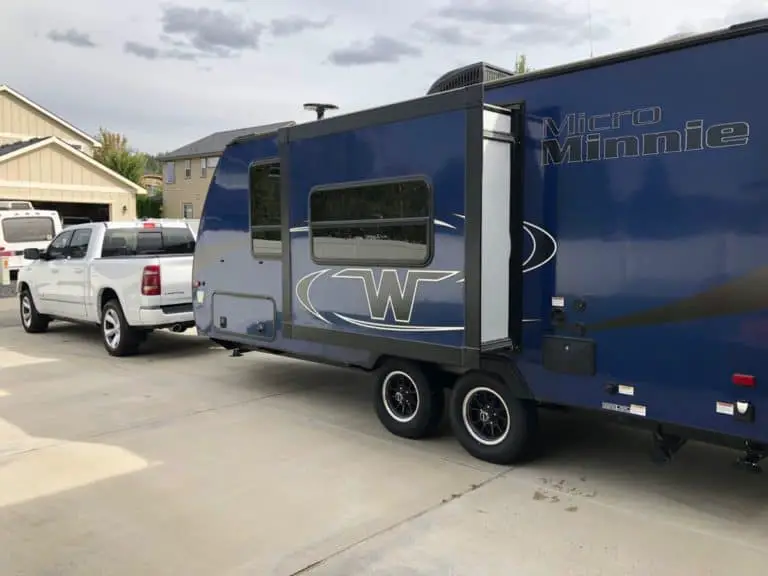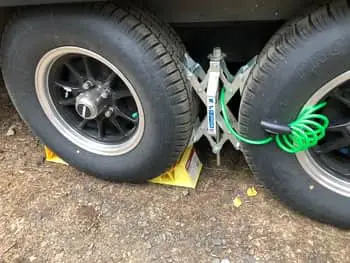What to Look for in a Used Popup Tent Camper
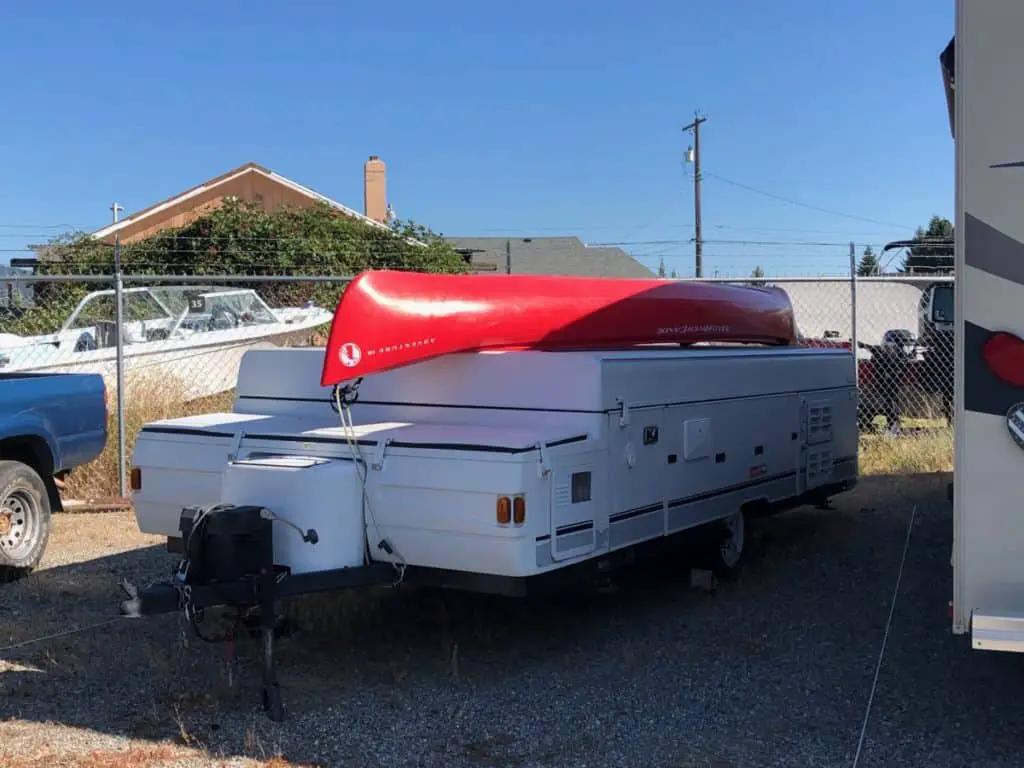
When purchasing a used pop up camper there will be many items to look for, questions to ask, and decisions to be made. This guide should help you determine what unit to buy, if it is a quality unit, and if it is in fact a good deal.
When shopping for a tent trailer, there are many decisions to be made based on what features you are looking for. Some pop up campers are basic units that are just a tent, and some have showers and bathroom facilities.
Don’t forget to read our article on how to determine used private party RV value. This can help you save thousands!
Major Features to Look For
Bathroom
For my wife and I, a bathroom was a must have feature when trailer shopping. That was one of the reasons why we upgraded from a tent. A bathroom will be very convenient for any user in a trailer, but depending on your needs may be a necessity, or you may camp at sites with great restroom facilities and may not need one.
Shower
Just as a bathroom, we wanted to have a shower to wash off after a long hike. In pop up campers, most showers are wet baths, but some may be found with a separate shower system. An outdoor shower is also a plus to wash off your shoes or rinse off outside to not fill your grey water tank.
Storage
Storage is usually a hot commodity in pop up campers as you cannot store anything tall due to the main cabin lifting up when you are parked and lowering when you are traveling. If you can find one with a tongue mounted storage you will be set as those boxes hold tons of items.
Beds
When determining the tent trailer you are looking for, how many you need to sleep is an important factor. Most have a bed in the front and the rear. Some have one that goes off to the side, dinette, or couch that will convert into a bed. Tent trailers usually will sleep a lot, but can be on the cramped side if you have 6 or more.
Hot Water Heater
Hot water in a tent trailer is an important feature, not only for showering if you have one, but for washing dishes. It is much easier to wash if you have hot water to clean grease.
Heat / A/C
Having a tent trailer with heat and/or air conditioning is a plus. The heat will actually keep you heated, but you will burn through more propane and it will be harder to keep up to temperature than a hard sided trailer due to the canvas areas. To learn more about heating a popup camper, read our article here. Likewise with air conditioning it will also keep you cool, but retaining the cool can be a challenge. Read our article on tips to keep cool in a popup here.
Living Area
In some campers, the living area is very small, and some it is larger. Usually it is only 12-14’ which can be an adequate amount based on layout and how many users. Popup campers are not meant to live in, just have some space in case it rains or in the night.
Budget
Make sure the trailer with necessary repairs and upgrades you need are within your budget. Chances are, you will get excited and buy extra accessories you didn’t think you need. You can buy a cheap pop up for as little as $1,500 or get a newer used model for as much as $10,000. If you are new to the camping game, I suggest getting one lower on the price range as it probably has depreciated the most and you will probably get almost as much out of it as you paid when you go to sell it.
Where Will you Store It?
The size of the physical trailer will determine if you will store in your garage, side yard, or rent a storage facility. Prior to purchase, determine out where you will store your RV. Most popup campers will store in a normal garage, unless it is something like a double pop up camper.
Is it big enough for your family?
Make sure it has enough beds and living area for your family. If you are having more kids, make sure to plan for a bigger unit than you need right now.
Will your vehicle tow it?
Make sure your vehicle or vehicle you are planning to get in the future will tow the pop up camper. Tent trailers are lightweight, so most can be towed with a full size car or mid size SUV.
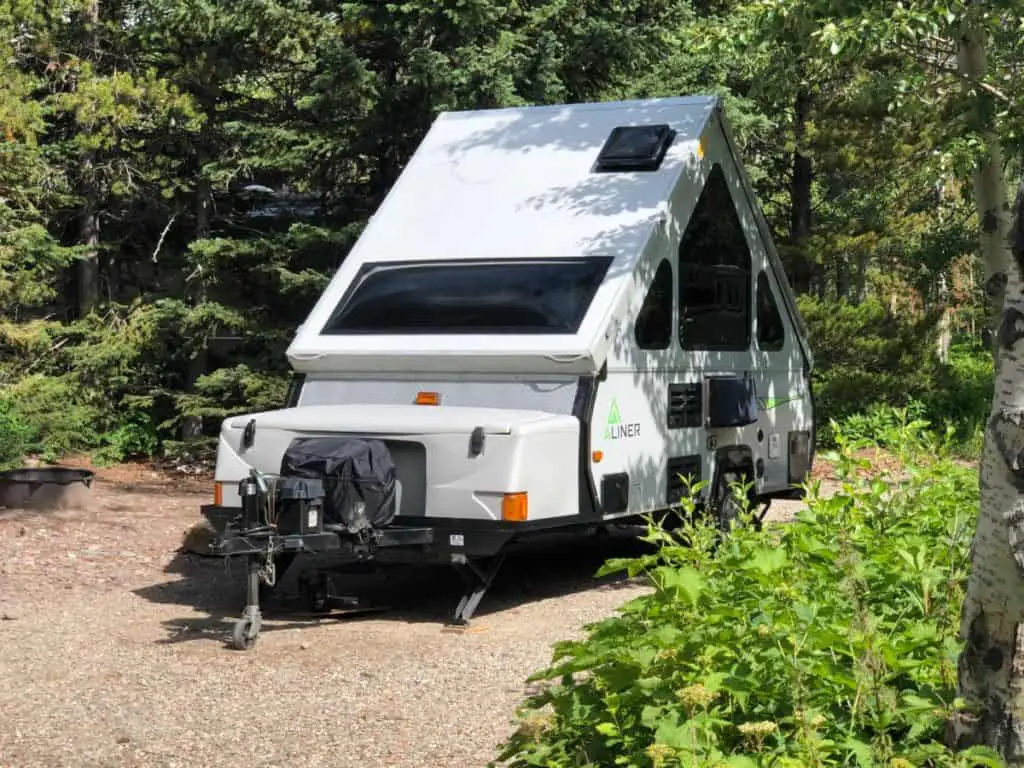
Items to Inspect on a Used Trailer
There are many items to look for when determining if the tent trailer is in good condition. Below are most of the factors, but depending on what options and features the unit you are looking at has, you may need to look at more.
Canvas
The canvas is one of the most important items on your pop up camper. If this leaks, is damaged, or stiff, you will have a bad time. You will want to use a hose and determine if there is any leaks in the canvas as these will require repair. While you have the hose out, check the roof for leaks.
The canvas should be looked over for mold. If there is mold present, this means the camper was put away wet and not dried out. Try and clean a part of the mold off if you find any. If it is hard to clean, you may need to get new canvas or pass on the trailer. You will not want to get a moldy trailer and breathe in mold spores. Here are some general facts from the CDC about mold and your health.
Roof
Check the roof for any damage or leaks. Try running water over it to see if the inside of the trailer gets wet. The roof is fairly small, so look it over and see if it needs any sealant or work. Check the roof for soft spots, this should determine if there is rot within the roof.
Flooring
The flooring will tell you if there is any subfloor damage. Walk over every inch including the corners of the trailer to make sure there are no soft spots. Soft spots can indicate damage to the subfloor due to water leaks or other rot. These can be repaired, but if you don’t want a project, you may want to pass on a unit with droopy floors.
Tires
On the side of the tires there will be a date code. Typically this is a 4 digit number with a month and the year as the second two digits. This will tell you how old they are and if they have been replaced.
Check the tires for extreme wear and cracking. If there is cracking on the outside, you can almost guarantee there is cracking on the inside. Tires should not be too expensive to replace on a pop-up, but always check so you can negotiate a couple hundred off if it needs new tires.
Axle
Look over the axle of the trailer to make sure there is no cracks, bends, or weird items going on. You can also check the suspension to make sure it is operating properly.
Bearings
Most bearings will require grease. Make sure they are not dry and have been greased at regular intervals. Ask the owner how often they were taken care of or repacked with grease.
Lift system
Check the lift system that lifts the pop up portion to make sure it is operating smoothly and opens without any noise, cracks, and that is opening evenly.
Water damage
Check the walls, flooring, plywood bed bunks, bedding, inside cupboards for any clues that there has been water that has leaked into the unit. Lots of trailers leak at one point, but it matters if the leak was quickly repaired, or if it was happing on the regular.
Battery Condition
Look at the date codes on the batteries to determine how old they are, ask the owner to verify that he charged them on the regular and that they were not depleted under 50% state of charge. Depending on use and quality, batteries can last from 3-5 years.
Check for Insect Nests
Look inside any vents, under the trailer, and around the trailer for any insect nests. This will tell you the trailer has not been used in a while or has not been looked after as well as one that has been kept up. You will need to use your judgment on this one.
Test Appliances
If the pop up camper has a refrigerator, microwave, range, hot water heater, air conditioner, furnace, tv, or any other appliances, make sure to test each one for proper operation. If the hot water heater runs off of 110v power and propane, check that both modes operate. The refrigerator should also be checked for operation on 120v, propane, and 12v if equipped.
Check Plumbing
If there is a sink, shower, or toilet equipped on your pop up camper, make sure both the supply plumbing and drain plumbing has no leaks or any smells associated.
Check Walls
Look at both the interior and exterior walls to make sure they are straight, leak free, and not damaged. Finding out the thickness of the walls will determine how much insulation is in the wall. Usually, you can see this through the door latch. Feel the walls for soft spots, this can mean rot in the wall section.
Undercarriage
Get under the trailer and go over all items such as the hitch, wiring, stabilizing jacks, insulation, piping, and any other item that is visible from under the tent trailer. Look for any rust on the frame as well as other components to make sure there is no problems. Some surface rust is ok, but you will want to get it protected once you take possession.
Test Drive
Prior to purchasing, you will want to test drive the trailer to make sure it tows straight, breaks work if equipped, lights work, the unit turns well, it doesn’t creek or make unnecessary noise, or any other items towing it will cause.
Lighting
Check to make sure your trailer lights work. Test the brake light, running lights, and left and right turn signals. While at it, check to make sure all of the interior lighting is working as well.
Stabilizing Jacks / Tongue Jack
Lower all of the stabilizing jacks and make sure they are operating properly and hold the weight of the trailer securely with little movement. Lower and raise the tongue jack to make sure it operates freely.
Tow Hitch
Operate and even hitch up the trailer to your vehicle to make sure the latching mechanism, safety chains, lighting, and all of the connections work and lock in place.
Hatches/doors
Check to make sure all storage hatches and doors shut and lock with the keys that come with the trailer. Make sure they stay fastened and don’t come open when you are on the road on your test drive.
Power System
Plug the trailer into 110v power and make sure the batteries are charging, look at the battery meter and see if it shows full when plugged in. Also, make sure all of your other 110v systems work.
Propane System
Check the propane system to determine that there is no leaks. This can be done with a spray bottle full of soapy water. Turn on the propane valve and spray the bottle over the propane lines and regulator to make sure it is not leaking.
Sewage System
Check the sewage system to make sure that the grey and black water tank valves work and make sure they are physically in good condition. If you notice any bad smells, you may need to have a good flushing of the black tank.
Determine What Repairs are Needed
After going over the trailer with a fine-tooth comb with all of the categories above, determine what work if any will need to be done on the trailer. Create a value of the amount of work and try and negotiate the selling price down, or if the work is too comprehensive, then pass and move on to the next pop up camper.
Is the pop up function too time consuming?
When you are setting up your trailer and looking it over, set the whole trailer up as if you are going camping. This will tell you how long it will take you to set up and takedown. Depending on the features this can be quick or a long time. Make sure you are prepared to do these steps every time you want to move the trailer. To find good lightweight trailers under 3,000 pounds you will not have to set up and take down, read about our favorites here.
Price you Should Pay for a Used Popup Camper
There are many factors that determine the price you should pay for a used popup camper. Here is a guide detailing how to determine used RV values.
Questions to ask the seller
- Do you have the title, and is it clean?
- You want to make sure you get a trailer with a clean title. Don’t deal with a seller who has lost a title as it is a complicated process. If you do, make sure they get the title prior to purchasing in case something goes wrong.
- Has there been any major repairs completed to the trailer?
- If there has been an accident or any repairs, you will want to know so you can judge if you still want the unit.
- How often did you use it?
- This will tell you if items are worn out or if they are like new.
- Did you put the canvas away wet?
- This will have a greater chance of molding inside the trailer.
- Where did you store it inside or out?
- A unit stored in the garage will have better exterior appearance as well as better seals and roofing.
- What maintenance has been done?
- This will tell you what maintenance is due to come up if items have not been taken care of.
- How many people can really sleep in it comfortably
- Ask to see if you can comfortably sleep the amount of people you have. Hopefully the seller is honest and gives you a good idea of if the layout worked and what he/she liked and didn’t to help guide your decision even if you don’t buy their unit.
- Ask how to winterize?
- If the seller tells you he/she winterized the unit and cant explain how to do it, you may be dealing with cracked pipes or other issues. To find out how to winterize a unit and what the seller should be describing, read about winterizing in our article.
Things to do once you buy it
- Go on a test trip close to home
- This will give you an idea of how to stock the unit for your future camping trips and you can run back home and get items you need or forgot.
- Have fun camping!
Be the first to be notified about FREE tips, hints, coupon codes, and email-exclusive information. All for FREE!

